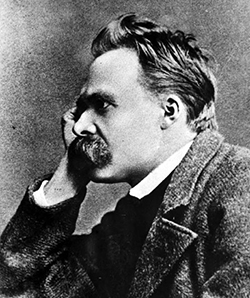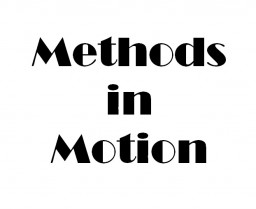
Since Copernicus humanity has been rolling from the centre toward X’, the 19th-century philosopher Nietzsche once wrote. He points to humanity’s loss of its own sense of importance and special status within the universe, and the uncertainty and unknowability regarding its nature and purpose. There is plenty of evidence that these changes have played an increasingly important role in the conceptual apparatus and analytic methods of European philosophers. This is relevant today, and reflecting on the question of knowledge may be pertinent to the Methods In Motion (MiM) perspective.
Nietzsche is perhaps one of the first modern thinkers to argue that the traditional ideal of stable and absolute (i.e. non-perspectival) knowledge in philosophy and ethics, but also in the sciences, was rife with anomalies. He felt that addressing this would need new ways of thinking and knowing. In one notebook entry the late Nietzsche writes rather cryptically:
The logical negation of the world and the annihilation [of its value] results from our need to oppose Being to Non-being [the Nothing], and that the concept of ‘Becoming’ is denied. (Friedrich Nietzsche, Unpublished Notebooks, 1887–88)
It requires a lot of analysis and contextual knowledge to make explicit the argument that Nietzsche makes in this aphorism. However, in short, he draws our attention to the exclusive disjunction that is built into our fundamental metaphysical concepts ‘Being’, ‘Nothing’ and ‘Becoming’. For example, imagine someone who believes that absolute Knowledge (with a capital) is a real possibility, and then, in striving to attain it, came to believe that there is only perspectival, contextually-valid knowledge. This causes an ‘exclusive disjunction’ to take effect: the now merely relative knowledge would fall short against the standard of absolute Knowledge from no perspective, and so appear to be worth exactly Nothing. This looks like a paradox – the quest for absolute knowledge has produced the result that absolute knowledge is impossible or, at least, unavailable. The shorthand name that Nietzsche gave to a reality of which we only ever have perspectival knowledge, and in which knowledge is relative to our method and context, is ‘becoming’.
Becoming is worth nothing to those who adhere to the traditional, ideal standard of absolute knowledge. And yet, for Nietzsche, it would be nihilistic to ‘deny’ Becoming. Denying Becoming would mean remaining trapped within a previous paradigm that still conceives of the world as static, as a something that can be known once and for all, in its ultimate composition, from some privileged position.
This brings us back to where we started, the rolling ‘towards X’ I quoted at the beginning. One possible response to this existential situation—the loss of humanity’s privileged position—could be to be in denial about it. Another response may be disorientation or even despair. A third response, of course, may be neither denial nor despair, but to take humanity’s new existential situation seriously and conceive of it as an opportunity.
Nietzsche at times wrote as if he wanted to use Becoming as the most general metaphysical concept with which to refer to reality. This he thought would be the first conceptual step in an attempt to develop better methods and theories that are useful for working in a world where knowledge is always relative to a perspective or method but no less valuable. In fact, such relative knowledge actually becomes more valuable.
Much of 20th century European philosophy has grappled with what they saw as our brave new existential situation, and variations of relativism are increasingly recognized also in the natural and social sciences (see Stenner’s Methods in Motion Blog 3). Relativism does not mean that “anything goes”. It requires us to take other perspectives and methods seriously, since none can claim absolute authority. Therefore, if relativism (or perhaps better- perspectivism,) is increasingly acknowledged as underpinning our conception(s) of reality, it is only through the establishment of new methods for thinking relatively and relationally that the real work can begin.
Methods In Motion
The Methods in Motion blogs are by researchers linked to the Centre for Citizenship, Identities and Governance. The blogs represent their opinions emerging from research in progress, and do not necessarily represent the views of the Research Centre or Open University. You can discover more about Methods in Motion on the CCIG website.






Rate and Review
Rate this article
Review this article
Log into OpenLearn to leave reviews and join in the conversation.
Article reviews